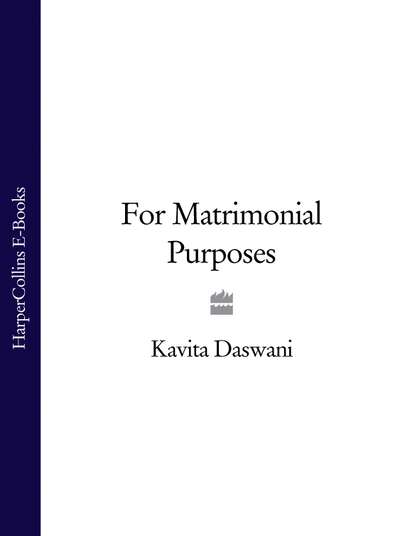По всем вопросам обращайтесь на: info@litportal.ru
(©) 2003-2024.
✖
For Matrimonial Purposes
Автор
Год написания книги
2018
Настройки чтения
Размер шрифта
Высота строк
Поля
‘Hah, hah, no problem, I’ll come,’ said Udhay, when my mother called him one evening. ‘But vill you send me your car and driver?’
He looked educated enough. No dhoti around his thin brown legs or tilok on his forehead. Indeed, he could have been a middle-rung civil servant, in his polyester shirt and trousers, with his sun-chapped feet in tatty chappals, and toting a brown leather satchel that looked as if it had barely survived World War Two.
‘So, vot is the problem?’ he asked, once seated, a cup of chai on the table next to him.
‘My daughter,’ said my mother, pointing to me, appropriately dressed for the occasion as I was in an unadorned cotton salwar kameez. ‘She has just completed twenty-one, and my husband and I are most worried, as no boys are approaching us. Maybe there is some grechari?’ she asked. This is a black cosmic cloud that is said to hang over the heads of the unfortunate, woebegone souls who are about to go bankrupt, lose a limb, or remain single for another year.
‘Ha, ha, don’t vurry, ve vill see vot is the problem,’ Udhay replied, reaching into his fatigued satchel to pull out the Hindu almanac, a pad of paper and pencil and a calculator.
‘Do you have her chart here?’ he asked.
My mother handed over a laminated sheet covered with elaborate drawings and interspersed with the names of planets in Hindi. Udhay consulted his almanac, jotting down numbers and punching in figures on his Casio hand-held calculator, muttering under his breath.
I sat on my sweaty hands, my mother next to me, both of us quiet but anxious, the only sound in the room from the sleepy whirring of the air-conditioner behind us.
All of my friends had already been forced to have their charts read – or their mothers had done so surreptitiously – so I knew I had no choice but to sit through it. Since graduating with a bachelor’s degree in commerce from Jai Hind College in nearby Churchgate, I had been having a rather grand time – or at least as grand a time as could be managed by a young girl in Bombay with a curfew and somewhat neurotic parents. But I needed to get serious about marriage, and this was the first step. So I adjusted the soft chiffon dupatta that was slipping off my shoulders and looked at Udhay’s face for any hint of what was to come. I knew, having heard about my friends’ experiences, that whatever he said in the next half-hour would set the tone for the rest of the day, indeed, the next several weeks. If the news was good – that I could and would be married within the year, to a good boy, good family, and all that, then my mother would be in such a fine and sparkling mood that my brothers would be allowed to hang out with their friends after school for at least an hour longer than usual.
I had observed, these past few months, how my mother’s innate joie de vivre seemed slowly to diminish under the weight of her anxiety about me. She had nothing to feel sad about, surely: my father’s business was thriving, allowing her to visit India Emporium to shop for Banarasi silk and French chiffon saris whenever it pleased her. Or to spend three afternoons a week playing rummy and eating pakodas with her friends. Or to go along to all those religious gatherings, baby-naming ceremonies, kitty parties, where she could show off a new, shiny piece of jewellery made by my father, or talk about how well her sons were doing in school.
But invariably, she would return home from each one of these social gatherings with her elegant head slightly drooping from her graceful, South-Sea-pearl-draped neck, telling me or whoever was around that she had just heard that Shanta’s son was engaged, or Mira’s niece or Renu’s grandson. My mother watched as all the women she grew up with, and all the distant relatives she had acquired after her marriage, were jubilant in their news of another engagement, another marriage, even another grandchild on its way. Sitting there, with her plate of pakodas and her share of playing cards, contriving a smile and uttering congratulations, she always wondered why – when it came to her daughter’s matrimonials – she had been dealt a bad hand.
‘More tea?’ I asked of Udhay, standing up to make for the kitchen, falsely believing that if I made a good impression, it might affect the outcome of things.
‘Nahin, bas, enough,’ the astrologer replied. Looking up, he said, ‘I think I have understood vot is happening here.’
I caught my mother’s short, whisper-quiet intake of breath, priming herself for the best news, or the worst. There were two words she would die if she heard: anura yoga – that the possibility of marriage does not exist.
‘Your daughter has rahu in her seventh house,’ he said, pausing. ‘The timing is not good for her now for marriage. She must vait.’
‘How long?’ my mother asked, biting her bottom lip, her face slowly turning white, as if she were being sentenced to Alcatraz.
‘Some years still,’ said Udhay sorrowfully. He hated being the bearer of bad news. It often meant that the envelope containing his cash payment when he left this session would be lighter than if he had delivered happier tidings.
Вы ознакомились с фрагментом книги.
Приобретайте полный текст книги у нашего партнера:
Приобретайте полный текст книги у нашего партнера:






